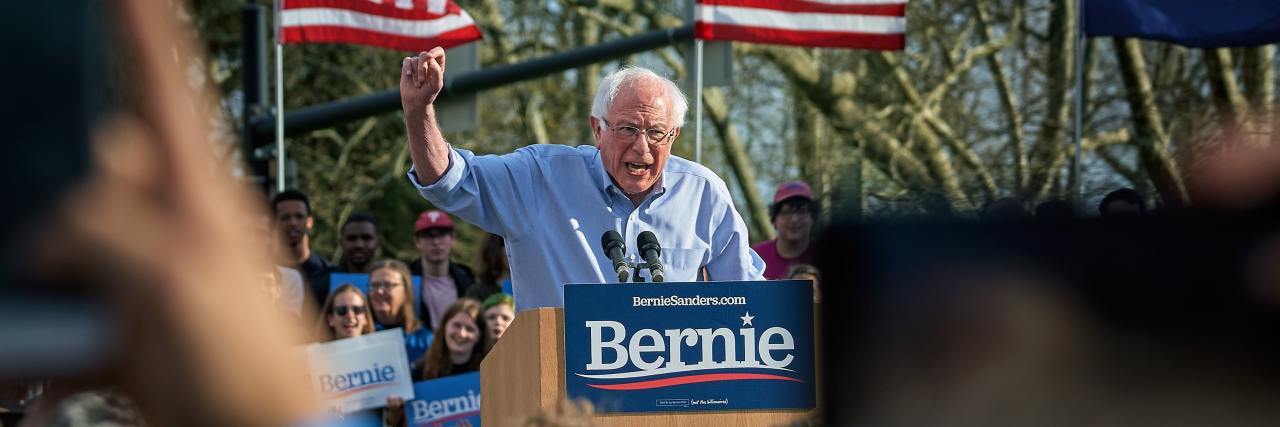Criticizing Bernie Sanders for Some of His Bullying Supporters Misses the Larger Point
Editor's Note
This story reflects an individual’s experience and is not an endorsement from The Mighty. We believe in sharing a variety of perspectives from our community.
Democratic presidential candidate Bernie Sanders has recently come under fire for the vicious attacks carried out by some of his supporters on social media. At the Democratic presidential debate in Las Vegas on Wednesday, February 19, Sanders’ opponents, from Elizabeth Warren to Pete Buttigieg, decried the vociferousness of the bullying by a contingent of the Sanders’ true believers. Buttigieg suggested there was something about Sanders himself or his campaign that breeds such hostility.
As a Bernie Sanders supporter who has been the victim of online bullying, I contend that the toxic nature of contemporary political discourse, not any one candidate, is the etiology of the hectoring. The reason I rarely participate in online debates is because of the conduct of my interlocutors, which has culminated in my retraumatization as someone who struggles with post-traumatic stress disorder (PTSD).
Back in 2016, a Hillary Clinton supporter who knew the candidate personally called me a “delusional, brainwashed pile of garbage,” after I changed my Facebook profile picture to one of myself posed with the Vermont senator. That another person, with human needs, wants and desires, may be reduced to literal refuse in service to an ideology is the epitome of dehumanization. When I received such a hostile message, it was impossible not to hearken back to my traumatic childhood.
While my experience with online bullying wasn’t optimal in 2016, as the 2020 campaign cycle commenced, my situation as a Sanders supporter worsened. Consenting to an interview about my copious collection of political memorabilia, a photo of myself holding a collectible Bernie Sanders doll by artist, Laura Lee Burch, headlined a CNBC article. I also was the first collector highlighted therein, which underscored my passion for amassing three-dimensional art connected to the Vermont senator and presidential candidate.
When I stumbled upon the comments on CNBC’s online Facebook page, a number of people left vomiting emojis directed at me. Another individual posted a GIF insinuating that even collecting Bernie Sanders items was a sign of “mental disease.” My weight was also targeted by one commenter, who proclaimed in his omniscience about my obesity, “It should have bought an exercise bike instead.” That anyone deserves to have object pronouns hurled in reference to her is dehumanizing; in other words, I am so aberrant that I don’t even belong to the human race. Many people won’t even use object pronouns in conjunction with their companion animals; to do as such to a human signifies that I am lower than a dog, a cat or someone’s pet hamster. As for my rotundity, I have exercise-induced asthma and a genetic condition strongly correlated with obesity, so a bike would cause only wheezing, not weight loss. Other pontificators, again using object pronouns, said I suffered from a dearth of dating desirability.
While the bullying left me traumatized for days, and I struggled with persistent perceptions of inadequacy, I understood that if I could be harangued that much for my appearance in one CNBC article, then I could only imagine the abuse that public figures with a higher profile than I receive on a daily basis. Unlike what was claimed by Warren and Buttigieg at the February 19 debate, however, it’s not merely Senator Sanders “stans” who engage in online bullying; it is adherents of all political ideologies. A healthy society needs to confront its own toxicity frontally with education and forceful denunciations from public figures, as well as stringent moderation standards on social media sites such as Facebook and Twitter. Weaponizing harassment for political gain misses the mark, obfuscating real solutions to cyberbullying.
Making matters worse, too often victim-blaming permeates public discourse about political hectoring. From all sides of the ideological divide, those of us who are victimized by America’s bully culture are told to grow a “thicker skin” or that we are “too sensitive.” Instead of tackling the systemic problem of bullying in the first place, shifting the focus from the perpetrators to the victims is part of the reason why online bullies rarely face any consequences for their actions.
If I hadn’t been in counseling for years because of my PTSD, I don’t know how I would have reacted to the spate of online harassment that I have received over the years for being a Sanders voter. And it is hardly just the political arena where hateful discourse has overtaken rationality. It seems like a semiweekly occurrence that I read stories of teenagers who die by suicide due to online trolling. Instead of blaming one politician for the actions of a cadre of supporters, we all must pledge to do better in ensuring that our online conduct embodies our highest of values, not our visceral rage or enmity over perceived grievances.
Photo by Vidar Nordli-Mathisen on Unsplash

